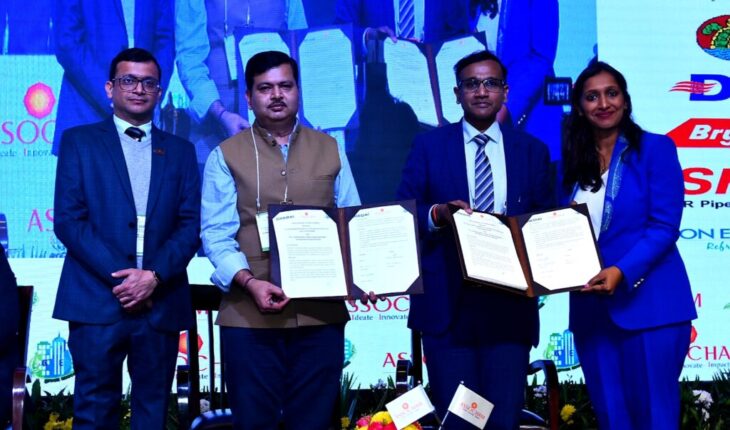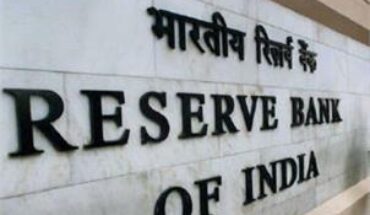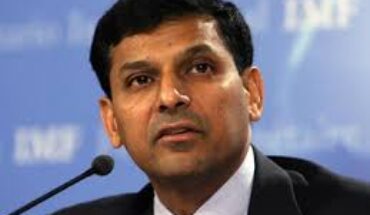NEW DELHI : The Associated Chambers of Commerce and Industry of India (ASSOCHAM) and the Confederation of Real Estate Developers’ Associations of India (CREDAI) have signed a Memorandum of Understanding (MoU) to foster collaboration and contribute to long-term development in the Indian business landscape in the real estate sector during the ASSOCHAM GEM 6th International Sustainability Conclave and Expo 2024 at New Delhi.
GEM green building certification program is a sustainability Initiative of ASSOCHAM to care for the Mother Earth and is an indigenous program based upon BEE ECBC 2017 and NBC 2016 and includes Sustainability, Energy and Water Efficiency, Fire and life safety, Indoor Air Quality, Daylight, Fresh Air and Human Comfort. ASSOCHAM awards GEM Green Building Certification Rating, to all GEM compliant buildings.
According to the Memorandum of Understanding, ASSOCHAM and CREDAI are committed to collaborating in areas of mutual interest to promote long-term growth and development, leveraging both organisations’ collective strengths and expertise for the benefit of their members and the industry as a whole. The key objective of this relationship is the creation and promotion of training and educational programmes focused on sustainability and related topics. These projects seek to improve industry knowledge and skills while also actively contributing to the larger goal of encouraging sustainable practices in the corporate community.
To encourage widespread participation and raise awareness, ASSOCHAM and CREDAI will actively promote these training programmes among their member organisations. This proactive outreach is critical for cultivating a culture of continuous learning and guaranteeing widespread participation in projects that help the sector progress.
The partnership extends beyond national lines, with ASSOCHAM and CREDAI working together to create and participate in global conferences and exhibitions. This strategic alliance seeks to strengthen national and worldwide cooperation between the organisations and their respective members, as well as to provide a forum for presenting industry expertise and cultivating global connections.
The signing of this MoU is an important step forward for ASSOCHAM and CREDAI, demonstrating their commitment to long-term development and collaborative efforts in an ever-changing business context. Through this strategic agreement, both organisations hope to make a major contribution to the progress of the Indian business ecosystem.
Milind Bhikanrao Deore, Secretary, BEE, Ministry of Power GOI addressed the GEM conclave by saying India’s commitment to sustainable infrastructure is a noble cause, underscored by its vital need for and importance of the current global scenario. As a developing nation experiencing robust economic growth of 6-8%, India faces a unique challenge. By 2030, its urban population is expected to swell to 600 million, necessitating the creation of additional infrastructure. This includes 3 lakh square feet of commercial space, contributing 6-7% to its GDP. Remarkably, the valuation of this sector in India is among the world’s largest. Buildings in India account for 34% of electricity usage and are the second-largest source of emissions, with the country’s total emissions standing at around 2500 million metric tons.
Astonishingly, 32% of these emissions are attributed solely to buildings. The main purpose of this sustainable infrastructure drive is to implement and regulate energy usage effectively. In the context of energy efficiency, the cement industry in India stands out as one of the most energy-efficient globally. This commitment to sustainability is further evidenced by India’s ranking of 4th in the Climate Change Performance Index, highlighting its significant strides in addressing climate challenges, said Deore.
Atul Bagai, Head UN Environment Programme, Country office India in his address showcased the current need for CO2 emissions reduction and sustainable infrastructure which is imperative to address climate change and ensure environmental resilience. As global carbon levels rise, sustainable infrastructure becomes essential for minimizing ecological impact, promoting energy efficiency, and fostering long-term socio-economic stability. Governments, industries, and communities worldwide are recognizing the urgency to transition towards greener practices, emphasizing renewable energy, eco-friendly transportation, and resilient urban planning to create a more sustainable future.
Pankaj Dharkar, chairman GEM green building council ASSOCHAM mentioned that the built infrastructure sector is one of the most important drivers of economic growth and social development, but also one of the most resource-intensive and environmentally impactful sectors. According to the International Resource Panel, the built infrastructure sector accounts for more than 50% of global material extraction, 40% of energy consumption, and 30% of greenhouse gas emissions. Moreover, the demand for built infrastructure is expected to increase. Therefore, there is an urgent need to transform the built infrastructure sector towards more resource efficiency and circular economy principles, in order to reduce its environmental footprint.
In his concluding remarks Anupam Mittal, Chairman ASSOCHAM GEM UP said eco-friendly buildings hold larger significance for sustainability. Increased partnerships between stakeholders and green principles should be followed for infrastructure development for lowering operational costs, he added.






